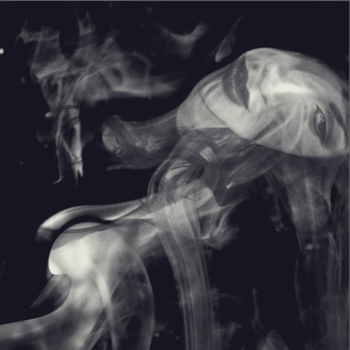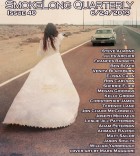Your excellent story, “The Empty Road,” feels fresh and topical. I was intrigued from the opening line. What inspired you to write about men who’ve lost wives in Afghanistan?
Thanks for being intrigued, Gay! Honestly, I don’t remember where the inspiration came from. I remember exactly what I was doing, walking to work, and I’d just passed an apartment building here in Jakarta, and there was a family standing, taking up the whole walkway. I had to step out into the road. I don’t know why, but more or less the whole story popped into my head right then. It’s strange, because the family had nothing to do with men who’d lost wives in Afghanistan, but that’s what I got from them. Perhaps the group’s father had something in his eyes that gave me the idea.
The genesis of your story helps to support the theory that if you’re a working writer, your mind is always working. I’d like to know more about what happened when you started this story.
The image of the man crossing in front of the car, the anger it provoked, that came about probably because I was stepping into the road. But anger was also something I’d been exploring in stories at that time. I was very open to anything connected to it. I knew angry people when I was younger and always promised myself I’d never be one of them. Around the time this story was written, though, I’d snapped at people a few times and lost my temper for things that, in the past, I would’ve let slide. Writing about anger helped me reflect upon what was going on with me.
At the same time, I wanted characters I hadn’t seen before, and thinking especially about gender roles. I’d read a lot of stories about loss, and had in the back of my mind a prompt from the always-inspiring Zoetrope Flash Factory for a story about love after death. I thought that loss in a certain type of man could give rise to this very firework-bright volatility.
What was your process? Did this story come to you all at once or did you need to coax and finesse it?
I wrote the story in a single sitting, and it was okay, it had that moment en route to the library; and one character farther into grief than the other with some attendant resentment. But the story didn’t feel complete; there was a hole in the middle. I remembered an image I’d written in another story about this stretch of road with seven traffic lights that made the characters grow increasingly angry. It fit so well in “The Empty Road,” I was surprised I hadn’t included it from the beginning. The older story dwelled a lot on this road, and for the image to fit into its new home, I had to cut a lot. The time spent cutting gave me a certain clarity about what the traffic light image represented and that was when I started seeing it as a metaphor for the stages of grief.
I’d heard a lot about how people grieve and had taken it for granted, but in writing I was forced to examine it. The stages idea is something useful, a tool that makes the immensity of loss far easier to deal with, partly because embedded in the idea of stages is the idea that the pain will end, that we get through the grief. I don’t know if that’s always true or not. And I worried, too, about what comes after the seven stages.
This story doesn’t give many answers, but for me it raised a lot of questions, and I was lucky enough to catch them all at the same time so that they could make it into a single piece. “The Empty Road” is one of my favorites, one of those rare times I write a story and it feels good, a little bit special.
If your stories were put in an anthology, what writers would you like to see in the table of contents? I’m thinking Benjamin Percy might be a good fit. Who else?
You recommended Benjamin Percy to me after seeing the story and I agree, he’s a fantastic writer. I’d be honored to be included in an anthology with him. For my perfect anthology, I would include all of my favorite writers, whether they fit my style or not. I’d like to see Etgar Keret in there, Gabriel Garcia Marquez, Italo Calvino, TC Boyle. Milan Kundera would write a new piece, so would Kazuo Ishiguro, Haruki Murukami, Zadie Smith, Jose Saramago, Elmore Leonard and Raymond Chandler. And some of the great flash writers around nowadays, like Randall Brown, SmokeLong‘s Tara Laskowski, Ethel Rohan and Stefanie Freele. I’m sure there are many more.
What are your plans, Christopher? Novel, a collection of shorts, or both? Tell us what we’ll get to read next from you.
The dream is to write the novel that becomes the film that makes me enough money so I never have to work another day in my life. I don’t know if I’m ready to write that yet—I have too short an attention span, I’m not good enough at committing; I fall out of love too quickly.
Until then, I have a different plan every day. Right now I’ve started writing about a lonely kid who may or may not have magical powers. I don’t know what’s going to happen to him, but I’ll find out until it’s not fun anymore. I have a sporadically updated tumblr account if anyone wants to keep up to date, Christopher James, and every once in a while, I record a new publication there or links to things I’m interested in.
Gay, thank you for the interview. I’m not a great fan of talking about myself or my work, and you’ve made the whole thing terribly painless and easy to do. Cheers!



 The core workshop of SmokeLong Fitness is all in writing, so you can take part from anywhere at anytime. We are excited about creating a supportive, consistent and structured environment for flash writers to work on their craft in a community. We are thrilled and proud to say that our workshop participants have won, placed, or been listed in every major flash competition. Community works.
The core workshop of SmokeLong Fitness is all in writing, so you can take part from anywhere at anytime. We are excited about creating a supportive, consistent and structured environment for flash writers to work on their craft in a community. We are thrilled and proud to say that our workshop participants have won, placed, or been listed in every major flash competition. Community works.